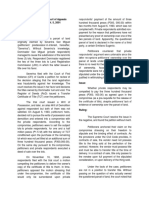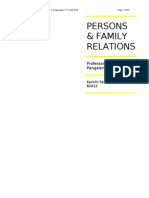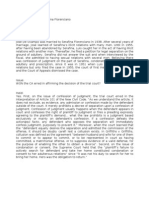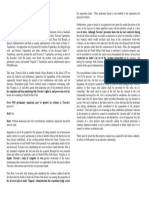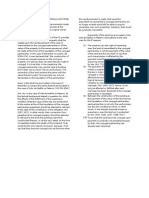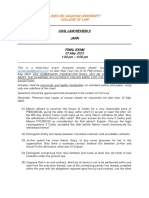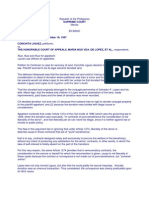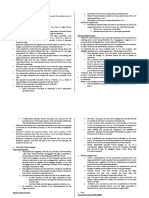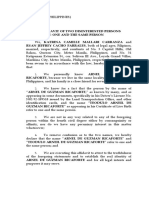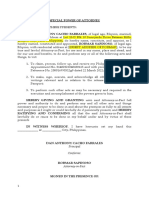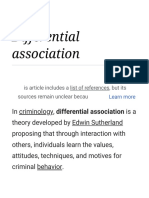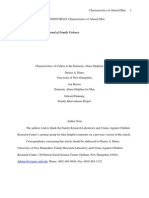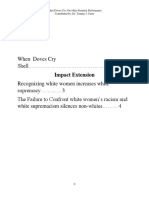Penalber v. Ramos
Penalber v. Ramos
Uploaded by
kdescallarCopyright:
Available Formats
Penalber v. Ramos
Penalber v. Ramos
Uploaded by
kdescallarOriginal Description:
Copyright
Available Formats
Share this document
Did you find this document useful?
Is this content inappropriate?
Copyright:
Available Formats
Penalber v. Ramos
Penalber v. Ramos
Uploaded by
kdescallarCopyright:
Available Formats
PENALBER V.
RAMOS
Petitioner is the mother of respondent Leticia and the motherin-law of respondent Quirino, husband of Leticia
PETITIONER PENALBER:
First Cause of Action
Petitioner alleged that she was the owner of a land in Ugac
Norte, Tuguegarao, Cagayan.
A residential house and a warehouse were constructed on the
said parcel of land which petitioner also claimed to own (Ugac
properties).
In 1986, she discovered that her title to the Ugac properties
were transferred in the name of spouses Ramos by virtue of a
Deed of Donation, which petitioner purportedly executed in
favor of spouses Ramos on 1983.
Petitioner insisted that her signature on the said Deed of
Donation was a forgery, as she did not donate any property to
spouses Ramos.
When petitioner confronted the respondent spouses Ramos
about the false donation, the latter offered that they would
just pay for the Ugac properties for P1 Million, to which
petitioner agreed.
In 1987, petitioner found out that the spouses Ramos were
selling the Ugac properties to respondent Bartex, Inc.
Petitioner then sent her son, Johnson Paredes (Johnson), to
caution respondent Bartex, Inc. that spouses Ramos were not
the lawful owners of the said properties.
Petitioner also warned spouses Ramos not to sell the Ugac
properties anymore, otherwise, she would file the necessary
action against them.
The spouses Ramos then assured her that they would do no
such thing.
As a precaution, petitioner even executed an Affidavit of
Adverse Claim over the Ugac Properties and caused the same
to be annotated on its title.
But spouses Ramos still executed in favor of Bartex, Inc. a
Deed of Absolute Sale over the Ugac properties in 1987 for
P150K.
Title over the properties were issued in favor of Bartex.
Petitioner prayed for the nullity of:
o Deed of Donation executed by petitioner in favor
respondent spouses Ramos;
o title issued in the name of respondent spouses Ramos;
o Deed of Absolute Sale executed by the spouses Ramos
in favor of respondent Bartex, Inc.;
o title issued in the name of respondent Bartex, Inc.
Petitioner argued that:
o the Deed of Absolute Sale executed by spouses Ramos
in favor of respondent Bartex, Inc. did not convey any
valid title, because:
Bartex, Inc. was a buyer in bad faith
spouses Ramos did not own the Ugac
properties
Second Cause of Action
Petitioner claimed that for many years she operated a
hardware store in a building she owned along Bonifacio St.,
Tuguegarao, Cagayan, on a commercial lot she leased from
Maria Mendoza (Mendoza.
In 1982, petitioner allowed spouses Ramos to manage the
hardware store.
In 1984, Mendoza put the Bonifacio property up for sale.
As petitioner did not have available cash to buy the property,
she allegedly entered into a verbal agreement with spouses
Ramos that:
o Since spouses Ramos have the better credit standing,
the lot would be bought by spouses Ramos for and in
behalf of petitioner
o they would be made to appear in the Deed of Sale as
the vendees so that the title to be issued in their
names could be used by them to secure a loan with
which to build a bigger building and expand the
business of petitioner
o P80K price for said lot would be paid by spouses
Ramos from the accumulated earnings of the store;
Mendoza sold the Bonifacio property to spouses Ramos, thus
said property was issued in the names of respondent spouses
Ramos.
In 1984, spouses Ramos returned the management of the
hardware store to petitioner.
Based on the receipts and disbursements, petitioner
asserted:
o that the Bonifacio property was fully paid out of the
funds of the store
o if respondent spouses Ramos had given any amount
for the purchase price of the said property, they had
already sufficiently reimbursed themselves from the
funds of the store.
Petitioner demanded from respondent spouses Ramos the
reconveyance of the title to the Bonifacio property to her but
the latter unjustifiably refused.
Petitioner insisted that spouses Ramos were mere
trustees of the Bonifacio property, thus, they were
under a moral and legal obligation to reconvey title
over the said property to her.
Petitioner, therefore, prayed that she be declared the owner
of the Bonifacio property and that the title in the name of the
spouses, be declared null and void
SPOUSES RAMOS alleged:
First cause of action:
o That petitioner, together with her son, Johnson, and
the latters wife, Maria Teresa Paredes, mortgaged the
Ugac properties to the Development Bank of the
Philippines (DBP) for P150K
o When the mortgage was about to be foreclosed
because of the failure of petitioner to pay the
mortgage debt, petitioner asked spouses Ramos to
redeem the mortgaged property or pay her mortgage
debt to DBP, promising to transfer full ownership of
the Ugac properties to them.
The agreement ensued and the petitioner voluntarily
transferred the Ugac properties to the spouses
through a Deed of Donation, thus a title was issued to
spouses Ramos.
spouses Ramos asserted that petitioner had always
been aware:
of their intention to sell the Ugac properties as
they posted placards thereon stating that the
said properties were for sale
that they finally sold the Ugac properties ro
Bartex, Inc.
So, petitioner was not entitled to any reimbursement
for the Ugac properties.
Second cause of action:
o that they were given not only the management, but
also the full ownership of the hardware store by the
petitioner,
o on the condition that proceeds from merchandise of
the store will be inventoried, and out of will be applied
to petitioners outstanding obligations and liabilities to
the spouses Ramos
o After settling and paying the obligations and liabilities
of petitioner, spouses Ramos bought the Bonifacio
property from Mendoza out of their own funds.
o
even if petitioner and spouses Ramos belonged to the
same family, the spouses Ramos faulted petitioner for
failing to exert efforts to arrive at an amicable
settlement of their dispute.
Hence, respondent spouses Ramos sought, by way of
a counterclaim against petitioner, moral and
exemplary damages and attorneys fees, for allegedly
filing a false, flimsy and frivolous complaint.
BARTEX alleged that:
o When a representative of the corporation inquired
about the Ugac properties for sale, spouses Ramos
presented their owners duplicate copy, together with
the tax declarations covering the parcel of land and
the buildings thereon.
o Bartex, Inc. even verified the title and tax declarations
with the Register of Deeds and the Office of the
Municipal Assessor
o spouses Ramos were then actually occupying the Ugac
properties and they only vacated the same after the
consummation of the sale to respondent Bartex, Inc.
o that the sale of the Ugac properties to the corporation
was already before petitioner caused the annotation of
an adverse claim to its title
o
As Bartex, Inc. was never aware of any imperfection
in the title of respondent spouses Ramos over the
Ugac properties, it claimed that it was an innocent
purchaser in good faith.
RTC:
First cause of action: DISMISSED
o the testimony of petitioner Penalber denying her
execution of the deed of donation over the Ugac
property in favor of spouses Ramos is by itself, not
sufficient to overcome the presumption of regularity of
the notarial deed of donation and its entitlement to full
faith and credit.
o Petitioner, in addition to her allegation that she did not
execute any such deed of donation in favor of spouses
Ramos should have had her allegedly falsified
signature on the deed of donation examined by
qualified handwriting experts to prove that, indeed,
she did not execute the same. Her failure to do so
results in the failure of her cause.
Second cause of action: IN FAVOR OF PETITIONER
o when petitioner allowed spouses Ramos full
management of the hardware store located on the
o
Thus, the
o
o
Bonifacio property in 1982, an inventory of the stocks
in trade in the said store was made showing stocks
worth P226K
And when she got back the store from spouses Ramos
on September 1984, another inventory was made in
the said store showing stocks worth P110K or a
difference of P116K
The only reason for an inventory to be done when the
hardware store was turned over to spouses was, to the
mind of the Court, for the latter to account for the
sales of such stocks.
Petitioner claims that the purchase price for the
Bonifacio property was to be taken from the proceeds
of sales from the hardware store which is more or less
P116K
spouses Ramos contend that said amount was
expended to pay off petitioners obligations to her
suppliers.
RTC decreed:
petitioner owned of Bonifacio property
ordering spouses Ramos to reconvey to petitioner the
said
spouses Ramos filed a Motion for Reconsideration assailing
the ruling of the RTC on petitioners second cause of action on
the ground that the alleged express trust created
between them and petitioner involving the Bonifacio
property could not be proven by parol evidence.
RTC denied the Motion for Reconsideration for lack of merit,
since spouses Ramos failed to interpose timely objections.
As such, spouses Ramos were deemed to have waived such
objections, which cannot be raised anymore in their Motion
for Reconsideration.
CA
o ruled in favor of spouses Ramos
o petitioner failed to prove her claim with the required
quantum of evidence
o
o
o
o
before management of the store was transferred to
spouses Ramos, a beginning inventory of the stocks of
the hardware store was made showing stocks
amounting to P226K
After management of the hardware store was returned
to petitioner, a second inventory was made with
stocks amounting to P110K showing a difference of
P116K
Contrary, to the RTCs finding, CA said that the
inventory showing such difference is not conclusive
proof to show that it was used to pay the purchase
price of the subject lot.
It is a basic rule of evidence that bare allegations,
unsubstantiated by evidence, are not equivalent to
proof.
As between petitioners bare allegation of a verbal
trust agreement, and the deed of absolute sale
between Mendoza and spouses Ramos, the latter
should prevail.
Although oral testimony is allowed to prove that a
trust exists, contrary to the contention of spouses
Ramos, and the court may rely on parol evidence to
arrive at a conclusion that an express trust exists,
what is crucial is the intention to create a trust.
While oftentimes the intention is manifested by the
trustor in express or explicit language, such intention
may be manifested by inference from what the trustor
has said or done, from the nature of the transaction,
or from the circumstances surrounding the creation of
the purported trust.
However, an inference of the intention to create a
trust, made from language, conduct or circumstances,
must be made with reasonable certainty
Petitioner failed to establish with reasonable certainty
her claim that the purchase of the subject lot was
pursuant to a verbal trust agreement with spouses
Ramos.
Petitioner filed this petition in SC:
ISSUES:
1) whether the existence of a trust agreement between her and
spouses Ramos was clearly established
2) whether such trust agreement was valid and enforceable.
HELD:
1) NO.
Trusts are either express or implied. Express trusts are created by
the intention of the trustor or of the parties. Implied trusts come
into being by operation of law. 33 Express trusts are those which
are created by the direct and positive acts of the parties, by
some writing or deed, or will, or by words either expressly or
impliedly evincing an intention to create a trust. 34 No particular
words are required for the creation of an express trust, it being
sufficient that a trust is clearly intended. 35 However, in
accordance with Article 1443 of the Civil Code, when an
express trust concerns an immovable property or any
interest therein, the same may not be proved by parol or
oral evidence.36
Petitioner has the burden of proving her cause of action in the
instant case and she may not rely on the weakness of the
defense of respondent spouses Ramos.
Burden of proof is the duty of any party to present evidence
to establish his claim or defense by the amount of evidence
required by law, which is preponderance of evidence in civil
cases.
Given that the alleged trust concerns an immovable property,
however, spouses Ramos counter that the same is
unenforceable since the agreement was made verbally
and no parol evidence may be admitted to prove the
existence of an express trust concerning an
immovable property or any interest therein.
BUT the spouses were deemed to have waived their
objection to the parol evidence as they failed to timely
object when petitioner testified on the said verbal
agreement.
Consequently, these testimonies were rendered admissible in
evidence.
The requirement in Article 1443 that the express trust
concerning an immovable or an interest therein be in writing
is merely for purposes of proof, not for the validity of the trust
agreement. Therefore, the said article is in the nature of a
statute of frauds.
The term statute of frauds is descriptive of statutes, which
require certain classes of contracts to be in writing.
It merely regulates the formalities of the contract necessary
to render it enforceable.
Oral evidence of the contract will be excluded upon timely
objection.
But if the parties to the action, during the trial, make no
objection to the admissibility of the oral evidence to support
the contract covered by the statute, and thereby permit such
contract to be proved orally, it will be just as binding upon the
parties as if it had been reduced to writing.
Nevertheless, while admissibility of evidence is an
affair of logic and law, determined as it is by its
relevance and competence, the weight to be given to
such evidence, once admitted, still depends on judicial
evaluation.
Thus, despite the admissibility of the said testimonies,
the Court holds that the same carried little weight in
proving the alleged verbal trust agreement between
petitioner and respondent spouses.
Petitioners allegations as to the existence of an express trust
agreement with respondent spouses Ramos, supported only
by her own and her son Johnsons testimonies, do not hold
water.
As correctly ruled by the Court of Appeals, a resulting
difference of P116,946.15 in the beginning inventory of the
stocks of the hardware store and the second inventory
thereof, by itself, is not conclusive proof that the said amount
was used to pay the purchase price of the Bonifacio property,
such as would make it the property of petitioner held merely
in trust by respondent spouses Ramos.
Such a conclusion adopted by the RTC is purely speculative.
The resulting difference in the two inventories might have
been caused by other factors and the same is capable of
other interpretations.
The petitioner failed to present sufficient proof to establish
the alleged express trust between them.
The fact that respondent spouses Ramos never denied
the P116,946.15 difference, or that they failed to present
proof that they indeed used the said amount to pay the other
obligations and liabilities of petitioner is not sufficient to
discharge petitioners burden to prove the existence of the
alleged express trust agreement.
The assailed Decision of the Court of is hereby AFFIRMED.
You might also like
- De Gala Heirs of San Miguel v. Court of Appeals Case DigestDocument2 pagesDe Gala Heirs of San Miguel v. Court of Appeals Case Digestgrego centillas100% (2)
- Uy vs. CaDocument12 pagesUy vs. CaKate DomingoNo ratings yet
- G.R. Nos. 133066-67 October 1, 2003 PEOPLE OF THE PHILIPPINES, Appellee, vs. ROMEO H. LAMBID, AppellantDocument2 pagesG.R. Nos. 133066-67 October 1, 2003 PEOPLE OF THE PHILIPPINES, Appellee, vs. ROMEO H. LAMBID, AppellantCarlos JamesNo ratings yet
- Poetry of Judith WrightDocument13 pagesPoetry of Judith WrightPaula JSNo ratings yet
- AYSON, JR. V FELIXDocument2 pagesAYSON, JR. V FELIXChilzia RojasNo ratings yet
- Chapter 1 - Requisites of Marriage (Art. 1-26)Document7 pagesChapter 1 - Requisites of Marriage (Art. 1-26)Drexel Arginald AltavanoNo ratings yet
- Agency: The de Leon PrimerDocument10 pagesAgency: The de Leon PrimerreylaxaNo ratings yet
- 30 Miciano Vs Brimo 50 Phil 867Document1 page30 Miciano Vs Brimo 50 Phil 867Patrick San AntonioNo ratings yet
- RP Vs Javier DigestDocument4 pagesRP Vs Javier DigestErrol TortolaNo ratings yet
- Agga Vs NLRCDocument2 pagesAgga Vs NLRCFrizie Jane Sacasac MagbualNo ratings yet
- Yuvienco v. Dacuycuy, G.R. No. L-55048, May 27, 1981 DigestDocument2 pagesYuvienco v. Dacuycuy, G.R. No. L-55048, May 27, 1981 DigestKyle JamiliNo ratings yet
- Deluao vs. Casteel 29 SCRA 350Document2 pagesDeluao vs. Casteel 29 SCRA 350Marilyn BachillerNo ratings yet
- PERSONS Finals Reviewer Chi 0809Document153 pagesPERSONS Finals Reviewer Chi 0809jufaedelNo ratings yet
- Digest Oca V GutierrezDocument2 pagesDigest Oca V GutierrezJamiah HulipasNo ratings yet
- Jose de Ocampo V Serafina FlorencianoDocument1 pageJose de Ocampo V Serafina FlorencianoantonpaguioNo ratings yet
- 1 - Tiglao V Manila RailroadDocument3 pages1 - Tiglao V Manila RailroadDanielle Palestroque SantosNo ratings yet
- Armigos V CADocument2 pagesArmigos V CAAljenneth MicallerNo ratings yet
- Motecalvo Vs Heirs of PrimeroDocument2 pagesMotecalvo Vs Heirs of PrimerohappypammynessNo ratings yet
- Yaptinchay V. Torres G.R. No. L-26462 June 9, 1969 Petitioner: Teresita Yaptinchay Respondent: Hon. Guillermo Torres - CFI Judge RizalDocument1 pageYaptinchay V. Torres G.R. No. L-26462 June 9, 1969 Petitioner: Teresita Yaptinchay Respondent: Hon. Guillermo Torres - CFI Judge RizalVergelGeronaNo ratings yet
- Gomez vs. CA, 168 SCRA 503 (1988)Document1 pageGomez vs. CA, 168 SCRA 503 (1988)Lovely Grace HechanovaNo ratings yet
- Case Citation: Date: Petitioners:: (Revocation)Document7 pagesCase Citation: Date: Petitioners:: (Revocation)Carie LawyerrNo ratings yet
- Timestamp Statement Type of Fallacy: Fallacies of Irrelevance: Argumentum Ad Misericordiam (Appeal To Pity)Document2 pagesTimestamp Statement Type of Fallacy: Fallacies of Irrelevance: Argumentum Ad Misericordiam (Appeal To Pity)KateDeseoNo ratings yet
- 91 Choco V SantamariaDocument4 pages91 Choco V SantamariaKrister VallenteNo ratings yet
- Digest 1Document4 pagesDigest 1Sumpt LatogNo ratings yet
- ORDUA V. FUENTEBELLA, G.R. No. 176841, June 29, 2010 A. 1403 - Statute of FraudsDocument1 pageORDUA V. FUENTEBELLA, G.R. No. 176841, June 29, 2010 A. 1403 - Statute of Fraudsanon_71222979No ratings yet
- Delta Motor V Niu Kim DuanDocument2 pagesDelta Motor V Niu Kim DuanJogie AradaNo ratings yet
- Siy Cong Being & Co vs. HSBCDocument2 pagesSiy Cong Being & Co vs. HSBCFricela KimNo ratings yet
- Francisco Vs FernandoDocument4 pagesFrancisco Vs FernandoKleyr De Casa Albete0% (1)
- Ma. Vilma F. Maniquiz vs. Atty. Danilo C. Emelo A.C. No. 8968, September 26, 2017 FactsDocument2 pagesMa. Vilma F. Maniquiz vs. Atty. Danilo C. Emelo A.C. No. 8968, September 26, 2017 FactsEduardNo ratings yet
- Wills and Succession ReviewerDocument25 pagesWills and Succession ReviewerShergina Grace AlicandoNo ratings yet
- Bellis Vs Bellis G.R. No. L-23678. June 6, 1967Document2 pagesBellis Vs Bellis G.R. No. L-23678. June 6, 1967Raje Paul ArtuzNo ratings yet
- Ramos-Balalio v. RamosDocument2 pagesRamos-Balalio v. RamosJanine CastroNo ratings yet
- People v. Jorolan DigestDocument3 pagesPeople v. Jorolan DigestMariano RentomesNo ratings yet
- SSSEA v. CADocument1 pageSSSEA v. CAJanelleNo ratings yet
- Lim v. ChincoDocument1 pageLim v. ChincoAlyanna ChangNo ratings yet
- J.R.S. Business VS Imperial InsuranceDocument2 pagesJ.R.S. Business VS Imperial InsuranceJoyceNo ratings yet
- Republic v. Castellvi, 58 SCRA 336: Interpretation of ContractsDocument4 pagesRepublic v. Castellvi, 58 SCRA 336: Interpretation of ContractsIJ SaavedraNo ratings yet
- Balero VS PeopleDocument1 pageBalero VS Peoplememory furikaNo ratings yet
- Megaworld Properties and Holdings, Inc. Vs - Majestic Finance and Investment Co., IncDocument7 pagesMegaworld Properties and Holdings, Inc. Vs - Majestic Finance and Investment Co., IncJoshua CuentoNo ratings yet
- Solid Homes V Tan G R No 145156Document3 pagesSolid Homes V Tan G R No 145156Anonymous 91f03cwNo ratings yet
- 37 4 Sia Suan and Chiao Vs AlcantaraDocument6 pages37 4 Sia Suan and Chiao Vs AlcantaraKing BautistaNo ratings yet
- SLDC vs. CADocument1 pageSLDC vs. CALaizaNo ratings yet
- Maramba Doctrine Vs Vda de Padilla DoctrineDocument1 pageMaramba Doctrine Vs Vda de Padilla DoctrineGenver MalnegroNo ratings yet
- KER & CO, LTD. vs. LINGAD (1971)Document1 pageKER & CO, LTD. vs. LINGAD (1971)Maya Julieta Catacutan-EstabilloNo ratings yet
- Case Digest-Contracts-General ProvisionDocument3 pagesCase Digest-Contracts-General ProvisionKê MilanNo ratings yet
- PROPERTY LastDigest ODocument7 pagesPROPERTY LastDigest Oyannie isananNo ratings yet
- Cabales vs. Court of AppealsDocument2 pagesCabales vs. Court of AppealshbcgNo ratings yet
- Civil Law Review 2, AY 2022-2023, Final ExamnDocument5 pagesCivil Law Review 2, AY 2022-2023, Final ExamnCacapablen GinNo ratings yet
- 48.peralta v. Philippine Postal Corporation (PhilPost)Document12 pages48.peralta v. Philippine Postal Corporation (PhilPost)sophiaNo ratings yet
- Munoz Jr. v. CarlosDocument7 pagesMunoz Jr. v. CarlosJasper Magbanua BergantinosNo ratings yet
- GR No. 236826Document2 pagesGR No. 236826Gillard Miguel GeraldeNo ratings yet
- Matabuena Vs CervantesDocument6 pagesMatabuena Vs CervantesdollyccruzNo ratings yet
- Suan Chan Vs Alcantara Case DigestDocument5 pagesSuan Chan Vs Alcantara Case DigestMarivic Veneracion100% (1)
- Liguez Vs CADocument3 pagesLiguez Vs CALynn MartinezNo ratings yet
- 08 Manotok V IACDocument2 pages08 Manotok V IACUPM ALSNo ratings yet
- Spouses Vallido v. Spouses Pono DigestDocument2 pagesSpouses Vallido v. Spouses Pono DigestNic OngNo ratings yet
- Ugalde V Ysasi (.)Document2 pagesUgalde V Ysasi (.)Jovi BigasNo ratings yet
- Anaya Vs PalaroanDocument2 pagesAnaya Vs PalaroanLouise Bolivar Dadivas100% (1)
- 85.j. M. Tuason & Co. Inc. v. Ligaya JavierDocument2 pages85.j. M. Tuason & Co. Inc. v. Ligaya JavierArmina BagsicNo ratings yet
- Penalber V RamosDocument5 pagesPenalber V RamosAleph JirehNo ratings yet
- Burden of ProofDocument42 pagesBurden of ProofAleph JirehNo ratings yet
- Affidavit of Two Disinterested Persons For Arnel RicaforteDocument2 pagesAffidavit of Two Disinterested Persons For Arnel RicafortekdescallarNo ratings yet
- Special Power of Attorney For Release of PassportDocument2 pagesSpecial Power of Attorney For Release of Passportkdescallar100% (1)
- 1 Follow-Up Letter To Atty. Mark Dale Diamond P. PerralDocument2 pages1 Follow-Up Letter To Atty. Mark Dale Diamond P. PerralkdescallarNo ratings yet
- v.3 Deed of Cancellation of Real Estate MortgageDocument3 pagesv.3 Deed of Cancellation of Real Estate MortgagekdescallarNo ratings yet
- 3 Board Resolution of B.E. San Diego, Inc. Re Release, Discharge, and Cancellation of REMDocument3 pages3 Board Resolution of B.E. San Diego, Inc. Re Release, Discharge, and Cancellation of REMkdescallarNo ratings yet
- 1999 Taxation Law Bar QDocument8 pages1999 Taxation Law Bar QkdescallarNo ratings yet
- DMIS Workflow of Litigation Cases Endorsement of New CasesDocument1 pageDMIS Workflow of Litigation Cases Endorsement of New CaseskdescallarNo ratings yet
- 1 Letter To VacateDocument1 page1 Letter To VacatekdescallarNo ratings yet
- People v. SandiganbayanDocument26 pagesPeople v. SandiganbayankdescallarNo ratings yet
- Airbnb: Arturo P. Boncato JR., DOT Assistant Secretary For Mindanao CitedDocument14 pagesAirbnb: Arturo P. Boncato JR., DOT Assistant Secretary For Mindanao CitedkdescallarNo ratings yet
- Thesis AnnexDocument19 pagesThesis AnnexkdescallarNo ratings yet
- Verification and CNFSDocument2 pagesVerification and CNFSkdescallarNo ratings yet
- Settlement Payment of Ronald Anduyo Acknowledgment Receipt1Document2 pagesSettlement Payment of Ronald Anduyo Acknowledgment Receipt1kdescallarNo ratings yet
- 2 Answer For Kimmy ConsunjiDocument103 pages2 Answer For Kimmy ConsunjikdescallarNo ratings yet
- Walsh v. R. Co: 36 N.E. 584, Am. St. Rep. 514Document8 pagesWalsh v. R. Co: 36 N.E. 584, Am. St. Rep. 514kdescallarNo ratings yet
- Thesis - 2 (Airbnb & Sharing Economy)Document9 pagesThesis - 2 (Airbnb & Sharing Economy)kdescallar0% (1)
- Thesis - 10 (Conclusion Recommendation)Document3 pagesThesis - 10 (Conclusion Recommendation)kdescallarNo ratings yet
- Pre Trial BriefDocument4 pagesPre Trial BriefkdescallarNo ratings yet
- PRE-TRIAL BRIEF - Kimmy Consunji (Final)Document10 pagesPRE-TRIAL BRIEF - Kimmy Consunji (Final)kdescallarNo ratings yet
- Additional Bibliography: HE Anila ImesDocument1 pageAdditional Bibliography: HE Anila ImeskdescallarNo ratings yet
- Republic of The Philippines Regional Trial Court National Capital Judicial Region Makati City Branch 1Document6 pagesRepublic of The Philippines Regional Trial Court National Capital Judicial Region Makati City Branch 1kdescallarNo ratings yet
- 4 Reasons God Stops Some Relationships From HappeningDocument3 pages4 Reasons God Stops Some Relationships From HappeningAbhi DandiwalaNo ratings yet
- Differential AssociationDocument15 pagesDifferential AssociationMeril MacaroniNo ratings yet
- CompensationDocument35 pagesCompensationRecordTrac - City of OaklandNo ratings yet
- Characteristics of Callers To The Domestic Abuse Helpline For MenDocument30 pagesCharacteristics of Callers To The Domestic Abuse Helpline For MenMGTOWNo ratings yet
- Sales Agreement: State of - Rev. 133EF4EDocument4 pagesSales Agreement: State of - Rev. 133EF4EAkash GuptaNo ratings yet
- When Doves Cry Shell .1-2: Impact ExtensionDocument5 pagesWhen Doves Cry Shell .1-2: Impact ExtensionMetelitswagNo ratings yet
- Gyan Bharati School Saket, New DelhiDocument3 pagesGyan Bharati School Saket, New DelhiIshitaNo ratings yet
- Preventing Suicide: A Global ImperativeDocument92 pagesPreventing Suicide: A Global ImperativeToronto Star100% (3)
- HoldDocument16 pagesHoldybun100% (1)
- MYCCASEDocument1 pageMYCCASEShiela Mae Angolluan BoquironNo ratings yet
- Volunteer PassportDocument16 pagesVolunteer PassportPaul RossNo ratings yet
- Yds Sinonimler KelimelerDocument6 pagesYds Sinonimler KelimelerMahir HamdiyevNo ratings yet
- Ce11fb1-Group 1 PPT On GmoDocument17 pagesCe11fb1-Group 1 PPT On GmoJunell Alcera Jr.No ratings yet
- One Word Substitution: Max. Marks: 35 No. of Qs. 35 Time: 25 Min. Date: ......... /........ /...............Document3 pagesOne Word Substitution: Max. Marks: 35 No. of Qs. 35 Time: 25 Min. Date: ......... /........ /...............somu_645No ratings yet
- 2011HB 06651 R00 HBDocument350 pages2011HB 06651 R00 HBPatricia DillonNo ratings yet
- Lord JimDocument9 pagesLord JimPriyanka Meena100% (1)
- Blue and Red Christmas Party Participation CertificateDocument14 pagesBlue and Red Christmas Party Participation CertificateSpree AbysNo ratings yet
- English SpecialDocument19 pagesEnglish Specialabhishek0988No ratings yet
- Laura by Saki (H.H. Munro)Document1 pageLaura by Saki (H.H. Munro)Sandeep Kumar VijayarajuNo ratings yet
- Comparison Between Okonkwo N ObeirikaDocument8 pagesComparison Between Okonkwo N ObeirikaDaffodil100% (2)
- Day 1 DO 57-04 EditedDocument17 pagesDay 1 DO 57-04 Editedmike camsNo ratings yet
- Torture Me BabyDocument1 pageTorture Me BabyWyjecNo ratings yet
- An Irac Analysis:: Manjuri Bera v. Oriental Insurance Co. LTDDocument6 pagesAn Irac Analysis:: Manjuri Bera v. Oriental Insurance Co. LTDjack jonesNo ratings yet
- Accreditation of Barangay Based NGOsDocument26 pagesAccreditation of Barangay Based NGOsVinvin Esoen89% (9)
- Towards The Third Universe: The Human Final Frontier: ("To Boldly Go To Where Some People Had Gone Before")Document4 pagesTowards The Third Universe: The Human Final Frontier: ("To Boldly Go To Where Some People Had Gone Before")api-16471202No ratings yet
- Happiness Is An Inside JobDocument4 pagesHappiness Is An Inside JobMã Văn TàiNo ratings yet
- Ge6075 - Pee - Unit 4Document42 pagesGe6075 - Pee - Unit 4Abhinav Bharadwaj RNo ratings yet
- GatsDocument14 pagesGatsLisa CozumelNo ratings yet
